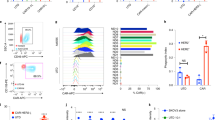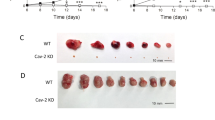Abstract
Chemokine gene transfer represents a promising approach in the treatment of malignancies. Macrophage-derived chemokine (MDC) (CCL22) belongs to the CC chemokine family and is a strong chemoattractant for dendritic cells (DC), NK cells and T cells. Using adenoviral vectors, human MDC gene was transferred in vivo to investigate its efficacy to induce an antitumor response and to determine the immunologic mechanisms involved. We observed that intratumoral injection of recombinant adenovirus encoding human MDC (AdMDC) resulted in marked tumor regression in a murine model with pre-established subcutaneous 3LL lung carcinoma and induced significant CTL activity. The antitumor response was demonstrated to be CD4+ T cell- and CD8+ T cell-dependent. Administration of AdMDC induced chemoattraction of DC to the tumor site, facilitated DC migration to draining lymph nodes or spleen, and finally activated DC to produce high levels of IL-12. Furthermore, a significant increase of IL-4 production within the tumors was observed early after the AdMDC administration and was followed by the increase of IL-12 and IL-2 production. The levels of IL-2, IL-12 and IFN-γ in serum, lymph nodes and spleen were also found to be higher in mice treated with AdMDC as compared with that in AdLacZ- or PBS-treated mice. The antitumor response induced by AdMDC was markedly impaired in IL-4 knockout mice, suggesting an important role of IL-4 in the induction of antitumor immunity by MDC. These results suggest that MDC gene transfer might elicit significant antitumor effects through efficient induction of antitumor immunity and might be of therapeutic potentials for cancer.
This is a preview of subscription content, access via your institution
Access options
Subscribe to this journal
Receive 12 print issues and online access
$259.00 per year
only $21.58 per issue
Buy this article
- Purchase on Springer Link
- Instant access to full article PDF
Prices may be subject to local taxes which are calculated during checkout








Similar content being viewed by others
References
Godiska R et al. Human macrophage-derived chemokine (MDC), a novel chemoattractant for monocytes, monocyte-derived dendritic cells, and natural killer cells J Exp Med 1997 185: 1595–1604
Imai T et al. Macrophage-derived chemokine is a functional ligand for the CC chemokine receptor 4 J Biol Chem 1998 273: 1764–1768
Vestergaard C et al. Overproduction of Th2-specific chemokines in NC/Nga mice exhibiting atopic dermatitis-like lesions J Clin Invest 1999 104: 1097–1105
Gonzalo JA et al. Mouse monocyte-derived chemokine is involved in airway hyperreactivity and lung inflammation J Immunol 1999 163: 403–411
Matsukawa A et al. Pivotal role of the CC chemokine, macrophage-derived chemokine, in the innate immune response J Immunol 2000 164: 5362–5368
Imai T et al. Selective recruitment of CCR4-bearing Th2 cells toward antigen-presenting cells by the CC chemokines thymus and activation-regulated chemokine and macrophage-derived chemokine Int Immunol 1999 11: 81–88
Golumbek PT et al. Treatment of established renal cancer by tumor cells engineered to secrete interleukin-4 Science 1991 254: 713–716
Tepper RI, Pattengale PK, Leder P . Murine interleukin-4 displays potent anti-tumor activity in vivo Cell 1989 57: 503–512
Noffz G, Qin Z, Kopf M, Blankenstein T . Neutrophils but not eosinophils are involoved in growth suppression of IL-4-secreting tumors J Immunol 1998 160: 345–360
Schuler T et al. T helper cell type 1-associated and cytotoxic T lymphocyte-mediated tumor immunity is impaired in interleukin 4-deficient mice J Exp Med 1999 189: 803–810
Hochrein H et al. Interleukin-4 is a major regulatory cytokine governing bioactive IL-12 production by mouse and human dendritic cells J Exp Med 2000 192: 823–833
Rissoan MC et al. Reciprocal control of T helper cell and dendritic cell differentiation Science 1999 283: 1183–1186
Mitchell DA, Nair SK, Gilboa E . Dendritic cell/macrophage precursors capture exogenous antigen for MHC class I presentation by dendritic cells Eur J Immunol 1998 28: 1923–1933
Timmerman JM, Levy R . Dendritic cell vaccines for cancer immunotherapy Annu Rev Med 1999 50: 507–529
Restifo NP et al. Identification of human cancers deficient in antigen processing J Exp Med 1993 177: 265–272
Tamada K et al. LIGHT, a TNF-like molecule, costimulates T cell proliferation and is required for dendritic cell-mediated allogeneic T cell response J Immunol 2000 164: 4105–4110
Chapoval AI et al. B7-H3: A costimulatory molecule for T cell activation and IFN-gamma production Nat Immunol 2001 2: 269–274
Qin Z, Noffz G, Mohaupt M, Blankenstein T . Interleukin-10 prevents dendritic cell accumulation and vaccination with granulocyte–macrophage colony-stimulating factor gene-modified tumor cells J Immunol 1997 159: 770–776
Sato K et al. TGF-β1 reciprocally controls chemotaxis of human peripheral blood monocyte-derived dendritic cells via chemokine receptors J Immunol 2000 164: 2285–2295
Tsujitani S et al. Langerhans cells and prognosis in patients with gastric carcinoma Cancer 1987 59: 501–505
Zeid NA, Muller HK . S100 positive dendritic cells in human lung tumors associated with cell differentiation and enhanced survival Pathology 1993 25: 338–343
Bell D et al. In breast carcinoma tissue, immature dendritic cells reside within the tumor, whereas mature dendritic cells are located in peritumoral areas J Exp Med 1999 190: 1417–1426
Regulier E et al. Adenovirus-mediated delivery of antiangiogenic genes as an antitumor approach Cancer Gene Ther 2001 8: 45–54
Rollins BJ . Chemokines Blood 1997 90: 909–928
Baggiolini M, Dewald B, Moser B . Human chemokines: an update Annu Rev Immunol 1997 15: 675–705
Mantovani A, Allavena P, Vecchi A, Sozzani S . Chemokines and chemokine receptors during activation and deactivation of monocytes and dendritic cells and amplificationof Th1 versus Th2 response Int J Clin Lab Res 1998 28: 77–82
Vecchi A et al. Differential responsiveness to constitutive vs inducible chemokines of immature and mature mouse dendritic cells J Leukoc Biol 1999 66: 489–494
Lane PJ, Brocker T . Developmental regulation of dendritic cell function Cur Opin Immunol 1999 11: 308–313
Nakashima E et al. A candidate for cancer gene therapy: MIP-1 alpha gene transfer to an adenocarcinoma cell line reduced tumorigenicity and induced protective immunity in immunocompetent mice Pharm Res 1996 13: 1896–1901
Mule JJ et al. RANTES secretion by gene-modified tumor cells results in loss of tumorigenicity in vivo: role of immune cell subpopulations Hum Gene Ther 1996 20: 1545–1553
Hedrick JA, Zlotnik A . Lymphotactin Clin Immunol Immunopathol 1998 87: 218–222
Emtage PC et al. Adenoviral vectors expressing lymphotactin and interleukin 2 or lymphotactin and interleukin 12 synergize to facilitate tumor regression in murine breast cancer models Hum Gene Ther 1999 20: 697–709
Dilloo D et al. Combined chemokine and cytokine gene transfer enhances antitumor immunity Nat Med 1996 2: 1090–1095
Sharma S et al. Secondary lymphoid tissue chemokine mediates T cell-dependent antitumor response in vivo J Immunol 2000 164: 4558–4563
Braun SE et al. The CC chemokine CK beta-11/MIP-3 beta/ELC/Exodus 3 mediates tumor rejection of murine breast cancer cells through NK cells J Immunol 2000 164: 4025–4031
Fushimi T, Kojima A, Moore MA, Crystal RG . Macrophage inflammatory protein 3alpha transgene attracts dendritic cells to established murine tumors and suppresses tumor growth J Clin Invest 2000 105: 1383–1393
Chantry D et al. Macrophage-derived chemokine is localized to thymic medullary epithelial cells and is a chemoattractant for CD3(+), CD4(+), CD8(low) thymocytes Blood 1999 94: 1890–1898
Steinman RM . The dendritic cell system and its role in immunogenicity Annu Rev Immunol 1991 9: 271–296
Banchereau J, Steinman RM . Dendritic cells and the control of immunity Nature 1998 392: 245–252
Chapoval AI, Tamada K, Chen L . In vitro growth inhibition of a broad spectrum of tumor cell lines by activated human dendritic cells Blood 2000 95: 2346–2351
Gilboa E, Nair SK, Lyerly HK . Immunotherapy of cancer with dendritic-cell-based vaccines Cancer Immunol Immunother 1998 46: 82–87
Sozzani S, Aliavena P, Vecchi A, Mantovani A . The role of chemokines in the regulation of dendritic cell trafficking J Leuk Biol 1999 66: 1–9
Hirao M et al. CC chemokine receptor-7 on dendritic cells is induced after interaction with apoptotic tumor cells: critical role in migration from the tumor site to draining lymph nodes Cancer Res 2000 60: 2209–2217
Morse MA et al. Generation of dendritic cells in vitro from peripheral blood mononuclear cells with granulocyte–macrophage colony-stimulating factor interleukin-4 and tumor necrosis factor-alpha for use in cancer immunotherapy Ann Surg 1997 226: 6–16
O'Doherty U, Ignatius R, Bhardwaj N, Pope M . Generation of monocyte-derived dendritic cells from precursors in rhesus macaque blood J Immunol Meth 1997 207: 185–194
Platzer C et al. Interleukin-4-mediated tumor suppression in nude mice involves interferon-gamma Eur J Immunol 1992 22: 1729–1733
Bosco M et al. Low doses of IL-4 injected perilymphatically in tumor-bearing mice inhibit the growth of poorly and apparently nonimmunogenic tumors and induce a tumor-specific immune memory J Immunol 1990 145: 3136–3143
de Saint-Vis B et al. The cytokine profile expressed by human dendritic cells is dependent on cell subtype and mode of activation J Immunol 1998 160: 1666–1676
Kerkvliet NI et al. Inhibition of TC-1 cytokine production, effector cytotoxic T lymphocyte development and alloantibody production by 2,3,7,8-tetrachlorodibenzo-p-dioxin J Immunol 1996 157: 2310–2319
Erbs P et al. In vivo cancer gene therapy by adenovirus-mediated transfer of a bifunctional yeast cytosine deaminase/uracil phosphoribosyltransferase fusion gene Cancer Res 2000 60: 3813–3822
Chartier C et al. Efficient generation of recombinant adenovirus vectors by homologous recombination in Escherichia coli J Virol 1996 70: 4805–4810
Lusky M et al. In vitro and in vivo biology of recombinant adenovirus vectors with E1, E1/E2A, or E1/E4 deleted J Virol 1998 72: 2022–2032
Ju DW et al. Adenovirus-mediated lymphotactin gene transfer improves therapeutic efficacy of cytosine deaminase suicide gene therapy in established murine colon carcinoma Gene Therapy 2000 7: 329–338
Cao X et al. Therapy of established tumour with a hybrid cellular vaccine generated by using granulocyte–macrophage colony-stimulating factor genetically modified dendritic cells Immunology 1999 97: 616–625
Zhang W et al. Enhanced therapeutic efficacy of tumor RNA-pulsed dendritic cells after genetic modification with lymphotactin Hum Gene Ther 1999 10: 1151–1161
Cao X et al. Lymphotactin gene-modified bone marrow dendritic cells act as more potent adjuvants for peptide delivery to induce specific antitumor immunity J Immunol 1998 161: 6238–6244
Horan PK, Melnicoff MJ, Jensen BD, Slezak SE . Fluorescent cell labeling for in vivo and in vitro cell tracking Meth Cell Biol 1990 33: 469–490
Liu L et al. Induction of Th2 cell differentiation in the primary immune response: dendritic cells isolated for adherent cell culture treated with IL-10 prime naive CD4 T cells to secrete IL-4 Int Immunol 1997 10: 1017–1026
Acknowledgements
This work was supported by grants from the TRAPOYT, National Natural Science Foundation of China (30/2/002, 30028022) and National Key Basic Research Program of China(2001CB510002). We thank Dr Zhenglong Yuan, Dr Zhenhong Guo, Dr Rui Zhang and Dr Hongmin Li for their expert technical assistance.
Author information
Authors and Affiliations
Rights and permissions
About this article
Cite this article
Guo, J., Wang, B., Zhang, M. et al. Macrophage-derived chemokine gene transfer results in tumor regression in murine lung carcinoma model through efficient induction of antitumor immunity. Gene Ther 9, 793–803 (2002). https://doi.org/10.1038/sj.gt.3301688
Received:
Accepted:
Published:
Issue Date:
DOI: https://doi.org/10.1038/sj.gt.3301688
Keywords
This article is cited by
-
Integration of single-cell sequencing and bulk expression data reveals chemokine signaling pathway in proliferating cells is associated with the survival outcome of osteosarcoma
BMC Medical Genomics (2023)
-
Fusion cytokine IL-2-GMCSF enhances anticancer immune responses through promoting cell–cell interactions
Journal of Translational Medicine (2016)
-
Exosomes from Dendritic Cells Loaded with Chaperone-Rich Cell Lysates Elicit a Potent T Cell Immune Response Against Intracranial Glioma in Mice
Journal of Molecular Neuroscience (2015)
-
TLR4 is essential for dendritic cell activation and anti-tumor T-cell response enhancement by DAMPs released from chemically stressed cancer cells
Cellular & Molecular Immunology (2014)
-
Attraction and Activation of Dendritic Cells at the Site of Tumor Elicits Potent Antitumor Immunity
Molecular Therapy (2009)



